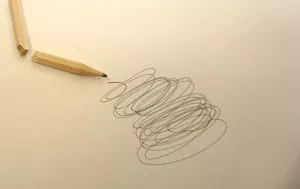- History of Smith-Corona Typewriters: From Shotguns to Spell Check - December 27, 2021
- Vintage Navigational Tools (And How They’re Useful Today) - December 25, 2021
- A Guide to Prohibition Era Clothing & Styles - December 23, 2021
Keeping a journal was an important part of daily life in the 19th century.
In fact, parents expected their children to record their daily activities in their diaries as a way to instill discipline and encourage reflection.
It is an old-timey habit that has stood the test of time.
We’ve since learned that keeping a journal is an excellent way to increase productivity, de-stress, and otherwise find peaceful moments away from our hectic modern lives.
Because of these noted benefits, journaling is a mental exercise that has generated a lot of interest among self-help and productivity experts.
But the challenge for most of us, just as with any other form of exercise, is finding the discipline to do it consistently.
And, to be sure, keeping a journal is most effective if it is done as a daily habit.
So this is the question: How do we keep this journaling habit going, every day, in the midst of all our other 21st century hobbies, distractions and obligations?
We set out to answer this question and find consensus among the experts.
Here are some of the key findings that most experts agree will help instill journaling as a part of your daily routine:
1) Set Aside the Time

One of the key ingredients to daily journaling success is setting aside the time to do it.
This means devoting a block of time, even just ten minutes, as part of your daily routine.
The need to set aside time may seem obvious, but we often have trouble carving out just a couple minutes of solitude these days.
But we need this dedicated time to just sit, think and write.
Experts suggest an easy way to find the time is to keep the journal next to your bed.
As part of your nightly routine, write a little to reflect on the day before you turn out the lights.
Writing for a few minutes at the end of the day is also a helpful way to release certain thoughts that may be causing stress.
Just getting the thoughts on the page may give you the mental freedom to simply relax and get some rest.
Also, try writing the time and date at the beginning of each journal entry. This will keep your journal structured and organized. It also reinforces the routine aspect of the exercise.
2) Keep it Simple
Keeping it simple is key to maintaining a journaling habit. Do not let the blank page intimidate you. It does not need to be a masterpiece.
The page is just a space to jot down some ideas, even mundane activities from the day, or questions you are pondering at the time.
Leo from Zen Habits recommends starting with just 2 – 3 bullet points.
The key is to put something on the page and develop the habit.
As you become more comfortable and inspired, the length and detail of your entries will likely grow.
But even if you simply continue to write a couple items, such as what you ate for breakfast or something humorous that happened that day, it’s perfectly fine.
As an article from Entrepreneur notes, your journal is really just a place to “brain dump” some thoughts and ideas. It’s not a work that needs to be “archived in the Smithsonian”.
3) Use a Notebook (That Means Pen and Paper)
 There are plenty of digital tools designed to help you take notes and stay organized. So why not just use your mobile device or laptop for daily journaling?
There are plenty of digital tools designed to help you take notes and stay organized. So why not just use your mobile device or laptop for daily journaling?
Well, there are a few reasons that having a physical notebook and writing are the preferable methods.
For one, writing down your thoughts, rather than dictating into your phone, encourages a deeper level of reflection and thought.
Also, if you are using a mobile device or computer, you will be more tempted by all the distractions at your fingertips.
Finally, as the Guardian notes, reading or writing on the screen can lead to ‘skimming’ rather than taking the time for serious contemplation.
If you decide to use a digital journal, make sure you turn off the wifi when you write to limit distractions.
As for the type of notebook, you don’t need anything too special for this.
For example, as Darius Foroux writes on Medium, a very simple lined notebook is all you really need to jot down your daily journal notes. Even just some scraps of paper will do.
However, a nicer journal, such as a classic leather bound version, might be worth purchasing if it will encourage you to write more.
On that note, many journaling proponents also recommend using a high quality pen to write. It will make the experience much more enjoyable.
4) Used Mixed Media, Doodle and Get Messy

If you’re using a simple lined notebook, it doesn’t mean you’re limited to just pen and paper.
Experts recommend adding sticky notes, scraps, doodles and more to the pages.
You can be as random, messy, tactile and creative as you want.
The materials you choose are completely up to you.
Ultimately, getting messy and adding different textures and illustrations to your notes can add context to your entries. It will definitely make the process more fun and enjoyable, too.
For example, if you’re keeping a travel journal, try gluing some photos or clippings right on the page. Add a caption or two and some notes about the trip.
You can also add maps, cut-outs from brochures, or other souvenirs to truly capture where you were on that particular day.
5) Don’t Hold Back (Be Painfully Honest)
While your journal entries can, and often should, be fairly simple and concise, it is also important to be honest.
Use the journal as a way to capture what is happening at the moment. That includes both the good and the bad stuff in our lives.
If you’re experiencing negative emotions or sadness, frustration or anxiety, make sure your entries reflect this.
When you look back, it will reveal what was really going on in your life at that time. What concerns, questions, or vulnerabilities were you confronting on that very day?
Being completely honest with your writing can help you deal with these emotions, challenge them, or just gain some perspective.
You may also realize how silly those thoughts appear in retrospect.
When you look back, and realize that you overcame these problems, it will strengthen your resolve.
6) Final Tip: Just Get Started
 This is the most important tip. Just start writing.
This is the most important tip. Just start writing.
But as we tend to overthink pretty much everything these days, even a simple thing like keeping a journal, we sometimes forget to just take the first step.
You need to start somewhere, so why not just crack open a notebook, write down the date, and simply state that this is the first day of your new journaling habit.
And then let tomorrow bring some new words to the page.
